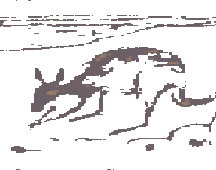

SCRUB CATTLE
Their breath is warm and sweet. It holds the smell
Of wind-brown grass and little fragrant flowers:
Their supple knees have brushed the drowsy blue
Of dancing harebells as they wandered through
Some little quiet sun-touched forest dell.
From dawn till dusk, through all the lovely hours,
These dwellers of the scrub tread free as wind,
Browsing the burnished blossoms of gorse,
Or lingering down fair groves that end in blind
White tangled avenues of flowering box
Where the soft air blows warm and manna-sweet;
And some still bolder than the others force
Narrow and twisted trails out for themselves
Through wild green weays, where 'neath their questing feet
The fallen brown leaves whisper like bush elves.
When thunder rolls its drums among the hills,
And purple clouds loom low, rich fold on fold,
The cattle call until the hot wind spills
Their wild deep-throated music far and far;
While at each flash of menacing keen gold
The sleek calves cower near the parent flank,
Their soft eyes grown dark with sudden fright.
The rain beats on the boles and splashes down
On thigh and shoulder, trickling like dun veins
Down the warm hides, until the softer hair
Breaks into little curls of dusky brown.
Then sullenly the thunder dies away,
The swift rain ceases, and, all sweet and fair,
The wet pools in the grass glow like gold stains:
The cattle move and sigh, then slowly stray
Upon their way again. The brindle cows
Crop the wet grass, or halt and patiently
Suckle their offspring with heads turned to stare
At yellow sunshine laughing through drenched boughs,
Then as dusk veils the glades in violet,
The cattle gather in some hollow there
Deep in the musk, and, lying close and still
They chew their fragrant cuds that smell of wet,
Crushed forest things; while from a distant hill
Ghostly, and thin as wisps of blue-grey smoke
Blown from a witch's fire, there comes a cry,
A poignant call that thrills into a sigh,
Mopoke! Mopoke!
Norma L Davis